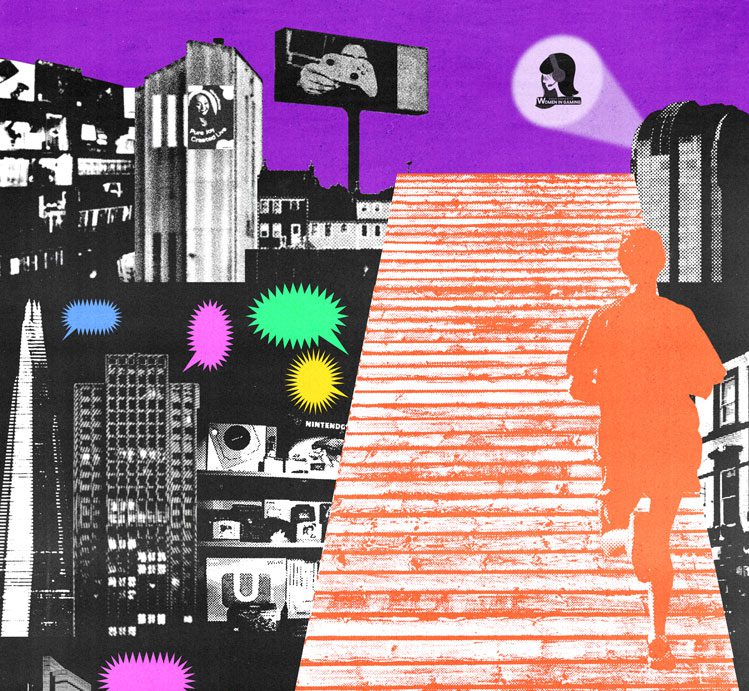The number of women who participate in online gaming has been on the rise within the past few years. Today, women account for 45% of gamers in the United States, an increase from 41% in 2020, according to a survey by the Entertainment Software Association. With that comes harassment from other players in online chats or viewers who remain hidden behind their screens.
According to reports by Reach3, 77% of women have experienced gender-specific discrimination. Among those are inappropriate sexual messages, mansplaining and men leaving the game when they find out they are playing with a woman.
Lisa Valdez has been gaming since she was 4 years old, thanks to her dad. “When I would log in to play games, I often found myself being harassed and being bullied,” says Valdez. “This doesn’t just happen to me, it would happen to other females as well, no matter how good or how professional they are.”
Valdez noted while at tournaments, people would say awful things to her. When she talked to her guy friends about it they said, “Oh wow. That happens to you guys?” With that, she brought an idea to the table in 2019 at Cal State Fullerton, where she is a senior communications major. She wanted women joining the video game industry to become more acceptable in our society. She reached out to the president and the board of the Gaming Club with her idea to start Women in Gaming. Everyone on the board agreed and told her: “Absolutely. One hundred percent.”
Despite everyone being on board with her idea, she came across an issue concerning the logo of Women in Gaming. The logo was a simple side profile of a woman wearing a headset. A male member questioned it and asked Valdez, “Why does it have to be a woman? Why can’t it be more gender-neutral?” Valdez wanted women to feel welcomed. If things were more “gender-neutral,” women might still feel discouraged to game. She wanted a group where women can be themselves, and be able to game in a caring environment. Valdez asked him, “Why do I have to appeal to your tastes and make it neutral? Being a woman is something to be celebrated.”
Jade Beasley, a Fullerton College student and online gamer, is also contributing to that 45% of women gamers. Beasley was destined to be a gamer since their parents used to play online games with each other before they were born. It started off at the age of 12 with them playing Team Fortress 2, and now they play games such as Paladins, World War Z and Apex Legends.
Beasley has never experienced harassment towards them in accordance with gender. Though, they have experienced some harassment of minor things. “Typically things like, “Why didn’t you back me up?” and “You’re trash!” because people can get upset when things in-game don’t go their way,” says Beasley. That is the only level of harassment they experience because they are part of the 59% who mask their gender online in order to avoid harassment due to their gender, reported by Reach3 Insights. The only information shared is their skill level, gamer tag, and other minor things you can only see in-game.

Fullerton local Emma Gutierrez has been a part of the female gaming community for many years She started gaming at 9 years old after being influenced by her three brothers. Her parents were fine with her gaming, but her grandmother had other thoughts. She didn’t like that at a young age Gutierrez was a tomboy and enjoyed video gaming. Now her opinion has changed. Her grandmother realized that it was better for Gutierrez to be inside playing games than going out and getting into trouble.
Gutierrez enjoys playing games on the Oculus, which is a virtual reality gaming headset. She also enjoys games such as Call of Duty and Fortnite. She admits that other gamers think she is faking her voice. They assume she is a boy because her voice cracks, though her voice is just high-pitched. “That’s just how I talk,” she says. Despite these comments, Gutierrez never hides who she really is. “I’m always honest when it comes to who I am in-game. Hobbies have no gender. If you want to play video games, then play video games,” she says.
Professional gamer Ashley, who keeps her last name private for safety, but goes by @MsAshRocks on Twitch, Instagram and Twitter, has been gaming since 3 years old. “It was already in my blood; I’ve been gaming ever since I was a little girl and never stopped,” says Ashley. At 15, she began recording herself playing a game called Call of Duty and uploading those videos to YouTube. At 19, she purchased her first-ever PC and started streaming in December 2016. Now, Ashley streams once a week and has 28,900 followers and 381 subscribers on Twitch.
As a young gamer, Ashley had family members who would shame her mom for allowing her to stay up all night playing video games. As Ashley became more successful with gaming and streaming, they apologized and said it was a good decision. Ashley has not only experienced sexism but also racism as a Black woman in gaming. “You’ll speak up in game chat and they’ll harass you and make fun of you because you’re a girl. Then apologize because you played better than them,” says Ashley.
For Ashley, a moment she remembers most was her first time playing Grand Theft Auto Roleplay while streaming. She joined a server and was immediately targeted. “They knew I was streaming. They kept running me over and shooting at me,” she says. They started yelling slurs at her so she and her audience on the stream could hear it. “It was really discouraging to get back into Grand Theft Auto Roleplay… going through those experiences just makes you stronger and makes you want to keep pushing forward for Black women in this industry… letting people know we do exist, we deserve this space, we deserve this industry.”
Ashley’s Twitch chat is always active with viewers, but there are times when they don’t say nice things. Recently, she says there are Twitch “hate raids” going on. This is when another streamer will come in after ending their stream and drop their viewers off to another streamer. Until Twitch gets these accounts under control, streamers have to use moderation tools that are provided. Currently, streamers are given the options of follower mode, subscriber mode and slow mode.
Even though Ashley has experienced so much harassment, she didn’t let that stop her from streaming and gaming. With that positive attitude and strength also came some big accomplishments. She raised over $100,000 for charities such as St. Jude Children’s Research Hospital, To Write Love On Her Arms, Save the Children and Color of Change. She was also featured on a billboard in New York for Twitch. She has also been working with Doritos. She is currently the only gamer that is part of Doritos’ Solid Black Program, which helps in uplifting Black voices throughout different industries.
Valdez, who started the Women in Gaming group at CSUF, has experienced harassment herself during many years of being a female gamer, but now has the opportunity to encourage young female gamers to keep pushing through. She is helping women gain their rightful spot in the gaming industry. Her advice to women gamers is, “Just do it anyway. Even if you think people won’t like it or if you think no one will care, just do it. The best feeling of all in gaming is being in your own element.”


